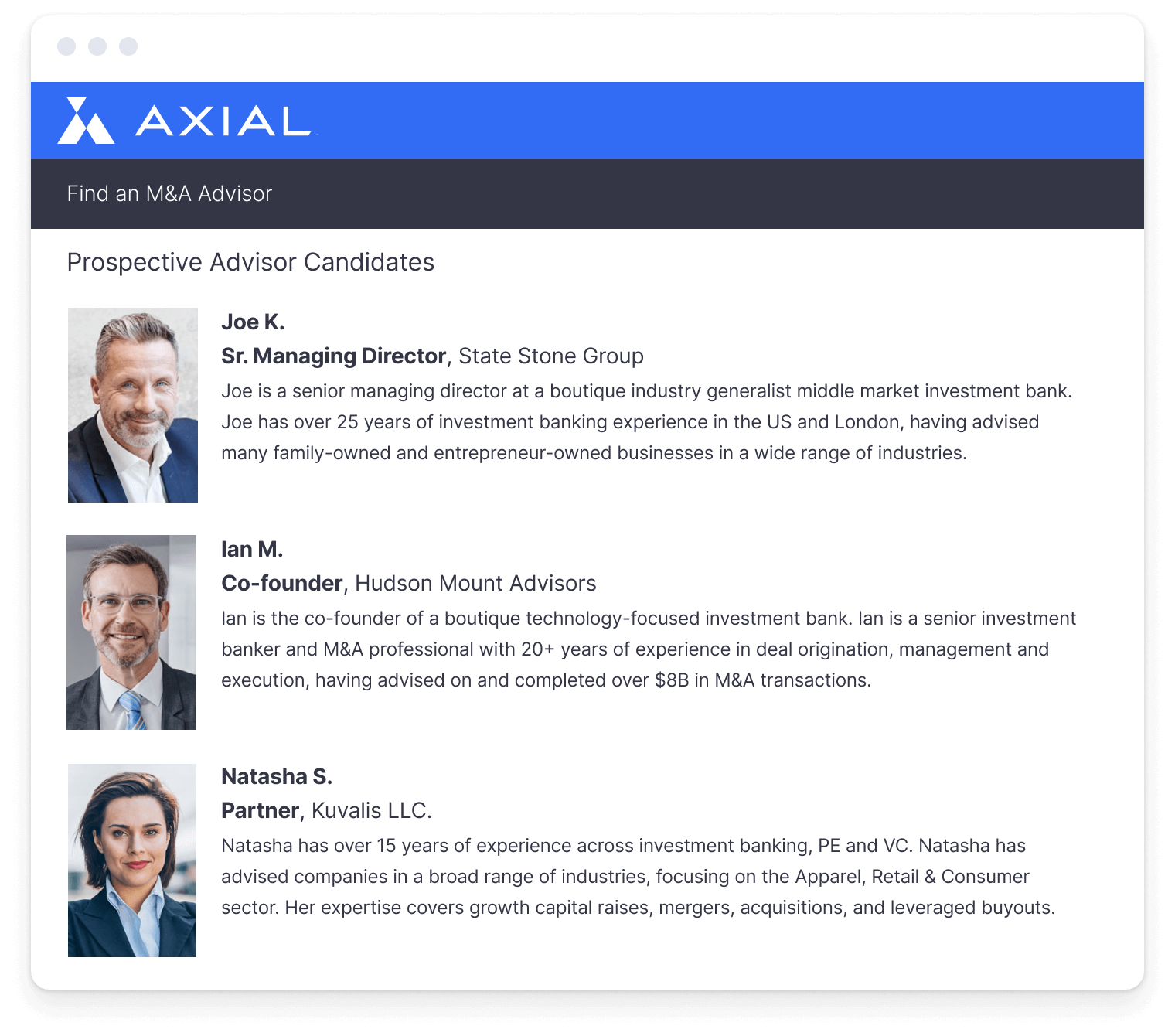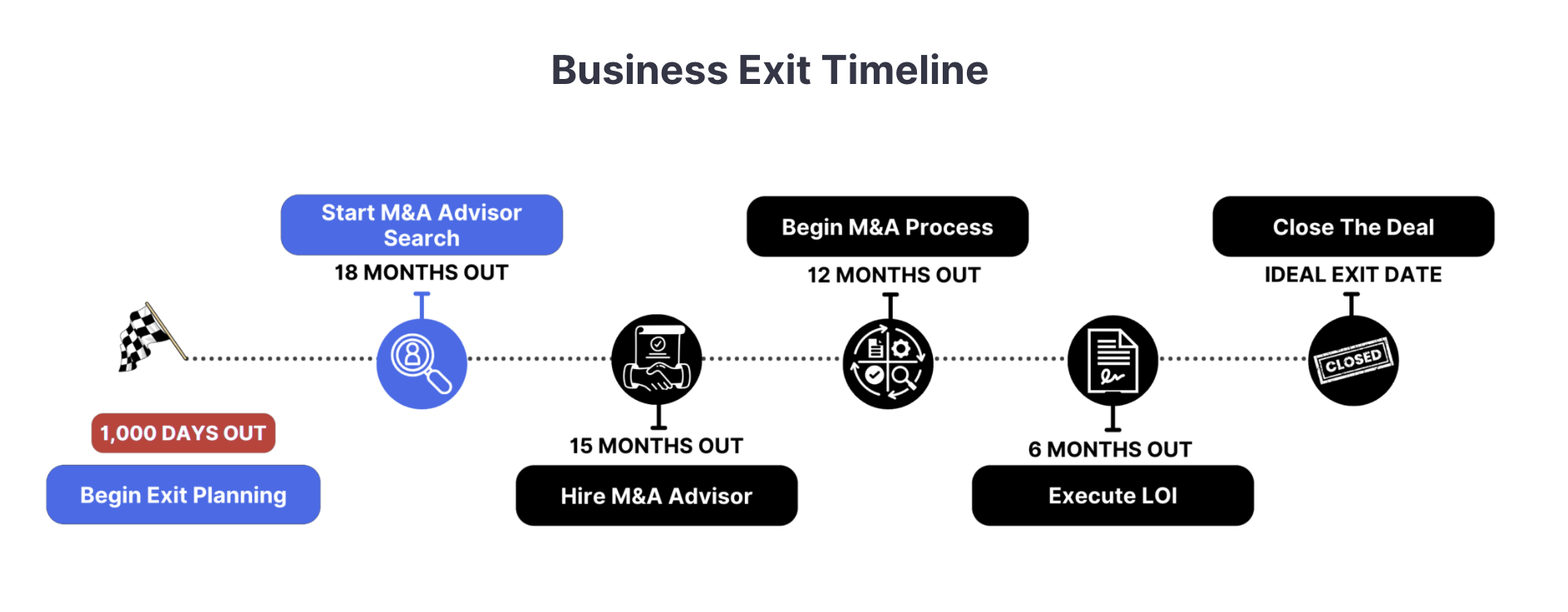
Preparing a Business for Sale in 3 Steps
We've created a 3-step guide to help prepare a business for sale, including exit planning, assembling your deal team, and starting the M&A process.
Partnering with an M&A advisor offers significant advantages while selling your business. We’ve found that companies are 60% less likely to complete a successful sale without an advisor. Studies have also shown that working with an M&A advisor can boost your purchase price by 6%–25%.
However, finding the right advisor is crucial for achieving those results. A common mistake businesses make is hiring an advisor lacking experience in their industry. This mismatch can hinder your advisor’s ability to produce compelling marketing materials, connect you with ideal buyers, value your business correctly, and handle questions and objections brought up by buyers while in negotiations.
In this post, we look at three different methods for finding an M&A advisor:
In our experience, the first two methods — personal referrals and doing your own research — aren’t optimal for most businesses. While you might find an advisor this way, you risk either casting too wide or too narrow a net, limiting your options. If you’re ready for a curated list of advisors tailored to your industry and transaction goals to help you sell your business, request a free consultation from our team.
Business owners often find an advisor or broker through introductions from trusted acquaintances. For example, if someone you know recently sold their business and was happy with the outcome, they may recommend their advisor to you.
While this approach seems sensible in theory, there are practical concerns to consider, such as:
Your acquaintance may mean well, but the connection they offer might not suit your business.
Word-of-mouth recommendations stem from a small, personal network, making it unlikely that the referral will be an expert negotiator for your specific business profile. Advisors who base their practice locally and attract buyers through a tight-knit network often lack expertise at the regional or national level. This could leave you with an advisor who is not equipped to bring in a suitable range of buyers for your business size.
Even if this personal connection has experience in your industry or similar deal size, there’s a strong chance you’ll find a better fit using more targeted methods.
Even well-intentioned personal recommendations can introduce bias into your hiring process. A personal introduction may lead you to favor a specific, limited option instead of exploring a broader pool of qualified candidates.
Just because an advisor or firm successfully sold a business for someone you know doesn’t guarantee they can replicate that success for you. It’s a common misconception that a personally introduced advisor is the best fit. In reality, the best advisor for your business should possess a diverse skill set, relevant experience, and the personal competency needed for your industry and deal size.
By nature, trust-based introductions take the place of a proper vetting process. If compatibility is factored in, it’s considered on a general or surface level. This type of referral doesn’t include a careful assessment of an advisor’s full range of skills, past performance, negotiation style, or network of buyers.
Trust-based introductions are extremely beneficial in a small market where demand for services is high, like getting reservations at an exclusive restaurant. But they are not the optimal method when there are plenty of options available and you’re trying to track down the best choice.
Without a comprehensive evaluation against other advisors, you may miss the critical competencies of an advisor that set your business up for a successful sale.
As a business owner, you’re used to being resourceful and doing a lot of things independently. But selecting an M&A advisor is a more significant decision than finding any third-party service or vendor. With an abundance of options available, understanding how to make an informed choice is both important and complex when conducting your own research.
Here are some areas where doing your own research is challenging:
Business owners may have a clear idea of what their priorities are for the sale (sell quickly, maximize their return, etc.). But this doesn’t translate to criteria you use to evaluate whether the advisor would help achieve your goal.
You may come across M&A industry-specific credentials and designations on a firm’s marketing materials, but it’s unclear what these mean. It’s not evident how important or credible these distinctions are.
You may also find that advisory firms demonstrate their track record via Closed Deals or Representative Transactions on their marketing materials, but that doesn’t tell the whole story.
For instance, one advisor might represent ten businesses in a year and close eight of them, while another could represent hundreds of businesses and only close eight. This distinction highlights how effective an advisor truly is at achieving successful outcomes for the engagements they take on. But the biggest challenge in evaluating advisors through this lens is the lack of access to close rate data, which makes independent research difficult.
You may feel confident about the qualifications you want in an advisor, but you might find it challenging to test or confirm whether you’re getting what you’ve been promised. Business owners often find a firm they feel confident in, only to be offloaded onto a junior advisor without the appropriate experience needed.
If you’re looking to sell your business quickly, chances are, you already have your hands full with running your company and preparing it for sale. Conducting a thorough search process for an M&A advisor is important, but it competes with other priorities you have going on.
There are few dedicated resources available online or in the market to help owners research M&A advisors. Search results can give broad tips and generalized advice on some qualities to look for, but there are not many that provide personalized support in your search or can help you spot red flags to look out for.
At Axial, we put together a robust set of resources for business owners navigating their exit. They’re not designed to replace an advisor. Instead, they serve as guides to help you initiate exit planning (which you should do before finding an advisor), hire the right M&A advisor, and manage them through the M&A process.
Doing your own research is a good starting point, or a decent method if you’re in no rush to sell. If you’re seriously considering a sale in the next 12–24 months, it will be best to leverage a curated advisor introduction service that matches you with vetted, qualified advisors.
At Axial, we use our experience in working with M&A advisors to help you find the right advisor for your exit. Our process starts by pairing you with an Exit Consultant who understands your business and your specific exit goals. From there, we analyze our network of over 2,000 M&A advisors to identify the best matches for your needs. You receive a curated list with detailed insights to help you evaluate each option.

Once you narrow down your choices, your consultant guides you through the interview process and provides resources to ensure you’re confident in selecting the right advisor for your business. This is the quickest and most comprehensive strategy to find a competitive M&A advisor for your specific needs.
With the information you provide, we hand-select matches from our network, where we’ve evaluated M&A advisors through the following criteria:

An M&A advisor helps businesses navigate mergers and acquisitions. This includes buying and selling businesses, capital raising, restructuring businesses, and addressing other corporate finance issues. M&A advisors can work for boutique advisory firms, investment banks, or business brokerage firms.
There are two types of advisors: buy-side advisors, who assist parties in acquiring businesses, and sell-side advisors, who help owners exit their businesses.
At Axial, we connect sell-side advisors with business owners looking to exit their business. Engaging in M&A advisory services offers several benefits to the process, including:
Advisors utilize three valuation methods to calculate an accurate, market-competitive valuation of your company, helping buyers understand its worth. They conduct a comparable company analysis, a discounted cash flow analysis, and precedent transaction analysis to pinpoint the most accurate valuation range. These analyses involve looking at financial records, industry trends, publicly traded companies, market sentiment, and more. An accurate valuation that you can reference in negotiations increases the chances of selling your business at the right price.
Additionally, an advisor can help you determine the best time to sell. For instance, they may be aware of upcoming regulatory changes that could impact your business’s value in the eyes of prospective buyers.
Advisors have access to a network of investors and a proven track record of reaching qualified buyers within your industry.
An advisor can often broaden your market of potential buyers, even targeting those you might overlook. For example, a successful franchised drop-off/pick-up laundry service found a viable buyer in a major laundry detergent brand. This may have seemed like an unconventional choice to the business owner, but the advisor recognized that the laundry detergent brand would be interested in owning a wider share of the laundry market.
Advisors will protect your identity and keep your business’s details private while advertising to potential buyers, adjusting their approach based on the degree of anonymity you need. This mitigates the risk of sensitive information being overshared or potentially leaked to the public.
An advisor will act as a level-headed mediator to manage communication with potential buyers and represent your interests during negotiations. While a business owners’ judgment can be clouded by the emotions involved in selling their business, advisors bring a much-needed, objective perspective to the negotiation table.
Good advisors can save business owners an estimated 25–30 hours per week, allowing them to focus on business growth or personal matters. In contrast, self-representing business owners are more likely to extend the time needed to complete a sale.
This is a very common misconception at the early stages of considering a sale. In reality, selling your business can be as time-consuming as a second full-time job and is more technically complex than many first-time sellers realize. We estimate that partnering with an advisor saves owners an estimated 25–30 hours per week, allowing them to focus on business growth.
Those weekly hours will accumulate, as selling your business tends to take place over a longer timeline than most owners initially realize.
We’ve put together a general estimate of what a successful exit can look like. From the day you start exit planning, to the day you close the deal, you’re looking at around 1,000 days — and that’s a favorable timeline.

If you choose to self-represent, you’re likely to prolong the process unless you have experience in mergers and acquisitions. Even then, you risk negatively impacting your company’s value, as your focus will be pulled away from running your business.
Advisory firms have the expertise of closing deals successfully and understand why deals commonly fail or lack efficiency at certain stages. This means they can help you avoid pitfalls and sell your business as quickly as possible.
Not all advisors are equally qualified. When you hire an advisor, you’re selecting them based on their experience and expertise. Some have specific track records while others specialize in specific areas.
If you hire without selective criteria, you may end up with a mismatched advisor who:
Lacks experience in your industry. In these instances, an advisor may struggle to:
Doesn’t have experience representing businesses of your size:
